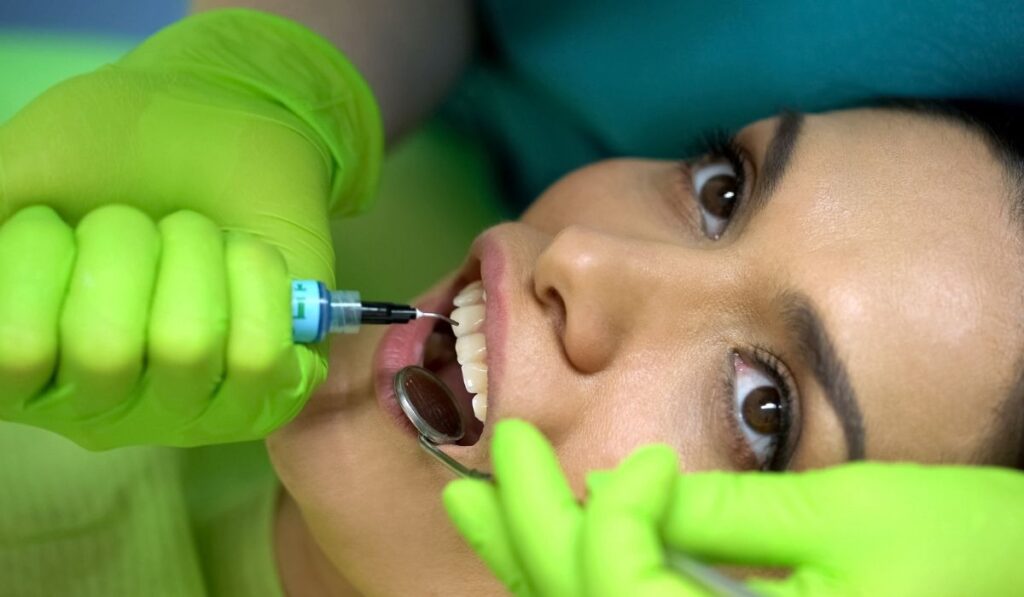Are you facing chipped teeth on a regular basis (or any more than once)? Teeth chipping is a problem that many people face, especially as they get older. After all, your teeth can become weaker and more vulnerable as you age. There are various reasons why teeth might chip, making it hard to point to just one main cause.
If you chew on hard substances, consume a lot of acidic and sugary food, and don’t provide your teeth with enough nutrients, they can become weak and chip away. Keep your teeth strong by following a proper diet, avoiding using your teeth as a tool, and staying away from very hard foods.
No one likes to deal with a chipped tooth, but luckily there are several options that your dentist might suggest for treatment. Let’s take a look at what might cause a chipped tooth, how to treat it, and how you can prevent it from occurring to you.
Why Are My Teeth Chipping Off So Easily?

Chipped teeth can be quite annoying and difficult to deal with, and if you don’t take proper care of your teeth this can start happening to you regularly. Remember, as an adult these are the only teeth you have, so it’s worth it to look at some of the chronic and acute situations that can lead to teeth chipping.
Eating Hard Food
Chewing on hard foods or substances such as ice, hard candy, fingernails, and jawbreakers can weaken your teeth. If you regularly chew on such things, your enamel can become weak and at a point, it can’t bear any more stress. At this point, the teeth might start chipping off.
Bruxism (Teeth Grinding)
Bruxism is a condition in which people unconsciously grind their teeth extremely hard. This ruins the integrity of the enamel and weakens teeth.
If you find yourself in a stressful situation and notice that you’re grinding hard on your teeth, it might be the cause of your teeth chipping off. It can also occur while sleeping, making your teeth more vulnerable.
Injuries or Accidents
Sports injuries, falls, and other accidents can damage your teeth and jaw. Damaged teeth are especially sensitive to any stresses. So, when you bite on food and put a little bit of pressure on your teeth, they might chip off.
Mineral Deficiency
A diet with an improper amount of calcium, phosphorus, or fluoride can cause weakened teeth, leaving them vulnerable to chipping.
Drinking only distilled water can also cause this, since the purified water is starved of minerals and, ironically, leeches those minerals out of your bones (including teeth) when you consume it.
Unhealthy Diet
A diet containing too much sugar or acid can make your enamel weak. When your enamel is weak, it becomes vulnerable and can’t handle too much stress. This can result in your teeth chipping from different parts.
Improper Bite
If you have an improper bite, it can cause some parts of your teeth to endure more stress than others. Those parts can, in turn, become weaker and eventually chip off.
How Do You Treat A Chipped Tooth?

Depending upon the severity of your chipped tooth, there are multiple treatment options that your dentist might suggest. If only a small piece of your tooth is chipped, it can usually be fixed in one dental visit.
Only your dentist can suggest the right procedure for you. Some of the common treatments for a chipped tooth are given below:
Dental Filling or Bonding
If you have a small piece of enamel that has chipped away, your dentist may choose to repair it with a filling or bonding.
Bonding uses a composite resin material to fill in a space or gap in the teeth. The color of resin resembles that of the chipped tooth and the appearance resembles the natural tooth.
Cap or Crown
For large pieces of tooth chipped away, dental caps or crowns are used. The remaining tooth is prepped to make room for the crown. Some materials for dental crowns are:
- Metal
- Gold
- Resin
- Ceramic
- Porcelain with Metal
The strongest material for a crown is metal but resin and porcelain crowns can better resemble the appearance of natural teeth.
Veneers
Your dentist may choose to use a single veneer for a chipped-off front tooth. Veneers give a smooth and even look to your teeth. The dentist takes an impression of your teeth and preps the front and edge of the tooth to place the veneers.
Veneers only cover the front of the tooth and will be custom-made to match the adjacent teeth.
How Do You Prevent a Chipped Tooth?
Prevention is always best, especially when it comes to losing a part of a whole tooth. Here are some preventive measures so that you can keep your teeth safe:
Consume a Proper Diet
A diet with the proper nutrients is important for the strength of your teeth. If your teeth are strong, they are less likely to chip due to improper care or diet, but strong enamel can still chip due to other forces put on the teeth.
Moreover, things like sugar and acid should be avoided as much as possible since they damage the enamel of your teeth. Damaged enamel means weaker teeth and more chances of your teeth chipping off.
Avoid Putting Stress on Teeth
Chewing on hard substances and biting your fingernails should be avoided if you want to keep your teeth intact.
Bruxism is another issue that can weaken your teeth to a great extent. If you suffer from bruxism, speak to your dentist about treatment. You may need a custom-made night guard. Avoid over-the-counter guards; they can actually cause more damage.
Moreover, don’t open bottles or jars with your teeth or do anything that puts unnecessary stress on your teeth.
Use a Mouthguard
Use a mouthguard while playing sports to avoid sports injuries. If your teeth get hit while playing a sport, they can become vulnerable and even a bit of stress can make a part chip off.
What Is the Difference Between a Chipped and Cracked Tooth?
Sometimes, people confuse a chipped tooth for a cracked tooth. It is important to understand the difference between the two for proper treatment, and a visit to your dentist can help you determine the best course of action.
Chipped Tooth
A chipped tooth is more of a cosmetic problem that affects the appearance of your teeth. In most cases, chipped teeth don’t cause pain until the chip is too big and your dental pulp is exposed.
A chipped tooth can be treated by filling or bonding if it is small; otherwise, dental crowns and veneers are good treatment options. In some cases, if a tooth is cracked severely enough, you may lose the tooth.
Cracked Tooth
Tooth cracking can appear within the enamel and continue down the root of the tooth. In some cases, if the crack is severe enough, it can be very painful and you should see your dentist.
When a fracture is still within the enamel, a routine filling or bonding may repair the chipped tooth; however, if the fracture is more severe, a crown may be placed in order to protect the tooth.
If the fracture/crack is down the root of the tooth and below the gumline, the tooth may need to be removed entirely.
Conclusion
Teeth chipping can usually be avoided if you take proper care of your teeth.
Seek medical attention if your teeth chip off regularly as this can be an indication of any of the issues we discussed above.


